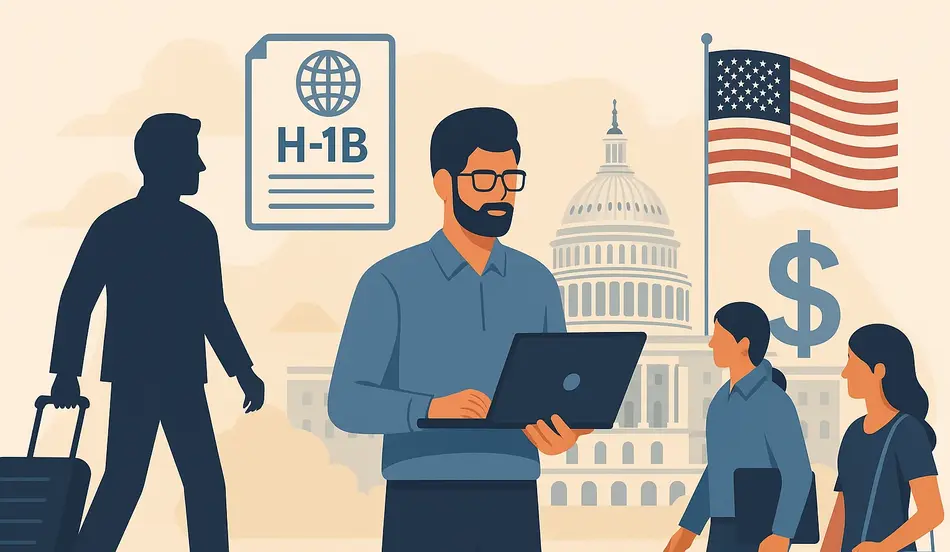The story of how the H-1B visa program, a cornerstone of the U.S. tech industry, is facing unprecedented challenges. The recent proposal to increase H-1B visa fees to $100,000 has sent shockwaves through the global technology sector, especially among Indian tech workers and companies that rely heavily on this talent pipeline. In this comprehensive analysis, we explore the legal battles, political strategies, and real-world impacts of these changes.
The H-1B visa program has long been a gateway for skilled professionals, particularly from India, to contribute to the U.S. economy. However, the proposed fee hike is not just a financial hurdle—it represents a significant shift in U.S. immigration policy, with far-reaching consequences for businesses, workers, and the broader tech ecosystem.
- What are the motivations behind the $100,000 H-1B fee proposal?
- How are Indian tech workers and companies responding?
- What legal challenges are emerging in response to these changes?
- How does this fit into the broader context of U.S. immigration strategy?
Background: The H-1B Visa Program and Its Importance
The H-1B visa allows U.S. employers to temporarily employ foreign workers in specialty occupations. For decades, it has been a critical tool for filling talent gaps in the technology, engineering, and healthcare sectors. Indian nationals have consistently been the largest beneficiaries, accounting for nearly 70% of all H-1B visas issued annually.
With the proposed fee increase, the cost of sponsoring an H-1B worker could become prohibitive for many companies, especially startups and mid-sized firms. This move is seen by many as an attempt to prioritize American workers and reduce dependency on foreign labor.
- Potential reduction in H-1B applications due to high costs
- Increased competition for limited visa slots
- Possible shift in global talent flows away from the U.S.
- Concerns about brain drain and innovation slowdown
Legal Challenges to the H-1B Fee Hike
Several legal challenges have already been filed against the proposed fee increase. Plaintiffs argue that the new fees are arbitrary, capricious, and violate the Administrative Procedure Act. They also contend that such a drastic increase would disproportionately impact small businesses and minority-owned firms.
Legal experts predict a protracted battle in the courts, with potential injunctions delaying implementation. Meanwhile, advocacy groups are mobilizing to lobby Congress and the administration to reconsider or modify the proposal.
Key Legal Arguments
- Lack of proper economic justification for the fee increase
- Discriminatory impact on certain nationalities and business sizes
- Potential violation of international trade agreements
H-1B Fee Hike: The $100,000 Question
Proposed H-1B fees of up to $100,000, combined with legal battles and shifting immigration strategies, could reshape global tech hiring. Employers can stay resilient by diversifying their talent pipelines and connecting with skilled professionals worldwide. Post your job on WhatJobs today and reach qualified candidates ready to contribute — free for 30 days.
Post a Job Free for 30 Days →Trump’s Immigration Strategy: A Political Perspective
Former President Donald Trump’s administration was known for its hardline stance on immigration, and the current fee proposal is seen by many as a continuation of that legacy. The strategy aims to protect American jobs, but critics argue it could undermine the U.S.’s position as a global innovation leader.
Political analysts note that immigration remains a hot-button issue in the lead-up to the 2026 elections. The H-1B fee hike is likely to be a major talking point, with both supporters and opponents mobilizing their bases.
Impact on Indian Tech Workers and Companies
Indian tech workers are at the epicenter of this policy shift. Many are reconsidering their plans to work in the U.S., while companies are exploring alternative destinations such as Canada, the UK, and Australia. The ripple effects are being felt across the global tech industry.
Indian IT giants like Infosys, TCS, and Wipro are reassessing their U.S. operations, while American firms are voicing concerns about talent shortages and project delays. The uncertainty is prompting some companies to accelerate investments in automation and remote work solutions.
Case Study: A Startup’s Dilemma
Consider the case of a mid-sized tech startup in Bangalore that has traditionally sent engineers to the U.S. on H-1B visas. With the new fee structure, the company faces a tough choice: absorb the additional costs, pass them on to clients, or scale back its U.S. operations. Each option carries significant risks and trade-offs.
FAQs
Q2: Why are H-1B visa fees being increased to $100,000?
A2: The proposed increase aims to reduce reliance on foreign labor and prioritize American workers, but it faces significant legal and industry pushback.
Q3: How will the H-1B fee hike impact Indian tech workers?
A3: Many Indian tech workers may reconsider moving to the U.S., and companies may look for alternative destinations or invest in automation.
Q4: What legal challenges are being raised against the H-1B fee increase?
A4: Lawsuits argue the fee is arbitrary, lacks economic justification, and disproportionately affects certain groups.
Q5: How does this policy fit into Trump’s broader immigration strategy?
A5: It aligns with efforts to protect American jobs but may harm the U.S.’s global competitiveness.
Q6: Can companies afford the new H-1B fees?
A6: Many startups and mid-sized firms may struggle, potentially leading to reduced U.S. operations or higher costs for clients.
Navigating the New H-1B Landscape
Ravi, a software engineer from Hyderabad, had planned to move to Silicon Valley in 2026. With the new fee structure, his employer is reconsidering the transfer, and Ravi is now exploring opportunities in Canada and the UK. This real-world example highlights the uncertainty and tough choices facing thousands of skilled professionals.
Unstoppable Success in the face of H-1B visa challenges requires resilience, adaptability, and a willingness to explore new horizons. As the legal and political battles unfold, the global tech community will be watching closely to see how these changes reshape the future of work.




